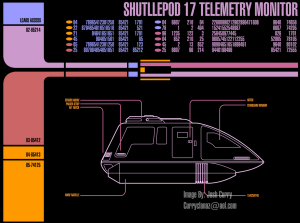I’ve had this idea forever, and at first it sounds like nothing new, but when you see how the pieces fit together you’ll recognize it as something a bit more original.
 The idea has its origin in a Star Trek exhibit that the Franklin held many years ago. One of the more creatively inspiring things about the exhibit was the user of the LCARS interface elements on each exhibit display. If you’re only marginally familiar with Star Trek the Next Generation, you’ll know the look of these things on sight. They’re really a contrivance for the show, offering no real UX benefit at all, but some computer applications have taken the look of LCARS and used it to produce some interfaces for things, whether they’re Star Trek-related or not.
The idea has its origin in a Star Trek exhibit that the Franklin held many years ago. One of the more creatively inspiring things about the exhibit was the user of the LCARS interface elements on each exhibit display. If you’re only marginally familiar with Star Trek the Next Generation, you’ll know the look of these things on sight. They’re really a contrivance for the show, offering no real UX benefit at all, but some computer applications have taken the look of LCARS and used it to produce some interfaces for things, whether they’re Star Trek-related or not.
The idea this spawned for me was a video game in which the participant was a student/cadet at Star Fleet Academy. The idea is that there would be a good amount of interesting fiction and story, but the fundamentals of space exploration - read: astronomy - would be taught to the user in an entertaining way. In other words, use the Star trek franchise to actually teach kids real things about space in a fun way. After all, this is the purpose of the Franklin, right?
Well, we all know that Star Trek isn’t anything about honest-to-goodness space exploration, so the melding of those ideas probably wouldn’t stick. But the idea of educational software on the topic of astronomy tied with a franchise has always been an interesting thought for me. Moving on to the present day…
I have this application on the iPad called Star Walk. Star Walk is in essence a map of the sky. What makes it interesting is that it uses the internals of the iPad (there’s a version for the iPhone, too) to make the map live and interactive. The end effect is this: If you hold the iPad up to the night sky, you see an overlay of labels and constellations on the astronomical bodies that exist behind your view of the iPad itself. It’s like putting an educational overlay on the sky.
I could speculate as to how this works, using the iPad’s internal sensors - the GPS, accelerometers, and compass - to figure out what’s behind it. But the main thing is that the pad becomes a transparent device to the universe behind it. People might call this artificial reality, and that’s fine and good, although I think that the term is a nice buzzword for “I’m going to sell you crap by showing you new places to buy things” than anything else, but it’s useful for explaining this whole game idea I promised in the title.
Because if you look at the capabilities of these devices, there are enough sensors on board and enough processing power and enough display capability that you can do something that I think is pretty neat.
So imagine that you’re Johnny, maybe 9-12 years old. You’re going on another of those annoyingly long trips to wherever that your parents always drag you on. You love Star Wars/Trek and space, and you like to play video games.
Your mom or dad loans you their iPad for the trip. On the iPad is a game that, having been pre-programmed by mom/dad, knows the GPS route that you will take in the car. But instead of showing you real things as you pass them in the car (which could still be pretty neat), it turns outside scenery into astronomical features of a video game.
The Starbucks? An intergalactic energy station. The McDonalds’? An enemy stronghold.
Hold the iPad up to the windows an look “ouside” the ship (car) to see what’s going on outside. Maybe this is a material collection game. Maybe it teaches you about astronomy as you go. There are a lot of options, and the “game board” would be helpfully generated by actual real-world places.
The best part, for the parents, is that the game knows when the kid has reached the “dock” destination, and doesn’t have to fight the kid to turn the iPad over when you reach Grandma’s.
The game doesn’t have to be exclusively astronomy-oriented, either. It could be a safari or some other kind of Earthly adventure. There are plenty of skins you could put on the game to change the angle of presentation and type of education imparted. Or it could simply be all fun, rather than impart any direct education at all.
The main potential blocker I see is the ubiquity of parents willing impart their iPads to a kid for long car or train (plane?) trips. It would be useful if the next Nintendo portable had some external sensors or the capability to connect to external sensors wirelessly for this purpose.
When this type of game comes to market, I’m going to have Berta do most of the long-distance driving.
Comments
To comment on this post, search for this URL in your ActivityPub client (such as Mastodon):
https://asymptomatic.net/posts/next-big-idea-backseat-video-gameNo comments yet. Be the first to reply via ActivityPub!